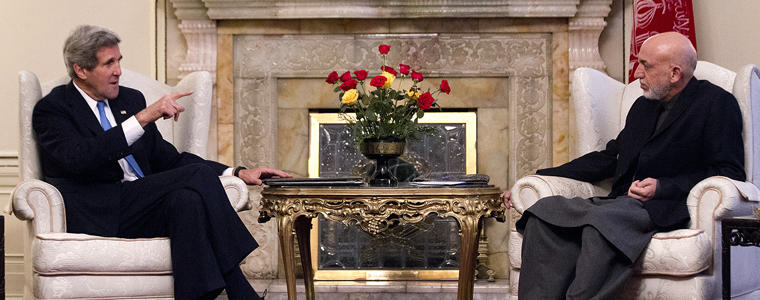President Hamid Karzai’s provocative statements and reluctance to recognize a Taliban representative office in Qatar may have roots in perceptions of U.S. intentions.

For American diplomats working on Afghanistan, all roads seem to lead to Doha. That’s where an office has been set up with the backing of the U.S., the Emir of Qatar and others to represent Taliban interests in potential peace negotiations that might produce a more stable Afghanistan when most coalition military forces leave at the end of 2014.
What the U.S. diplomats are waiting for is a sign from President Karzai that he will recognize and work with the Taliban representative office in Doha. They hoped this sign would come last weekend, when Karzai was in Doha to attend the Brookings Institution-sponsored U.S.-Islamic World Forum. Instead all they got was a speech by Karzai blaming the U.S. for global Islamic extremism, and an invitation to Qatari investors to consider Afghanistan. On the Taliban office, Karzai had apparently sought assurances on the scope of the office’s activities, and did not receive them.
The idea of a Taliban office in Doha first floated at the end of 2011 was a U.S. diplomatic masterstroke, an example of a cogent U.S. analysis of the facts leading to a bold and imaginative proposal. The U.S. desire to midwife a negotiation process between the Taliban and the Afghan government had been stymied in particular by lack of initiative from the Afghan government, and moves by Pakistan to obstruct any process in which they did not play a direct role. The Qataris had influence over both the Afghan government and the Taliban and have demonstrated a growing capacity for regional diplomacy. An office in Doha would bypass inertia in Kabul and obstruction in Islamabad.
The problem with diplomatic masterstrokes is that, unless they quickly change the facts on the ground, their effect dissipates. The remaining – and so far elusive -- piece of the puzzle is to secure Karzai’s acceptance.
Karzai is under severe pressure from the U.S. in particular to formally recognize the office. He continues to resist, despite recognizing the need for a peace process. The question is why, and the clues to the answer might be found in a few little-noticed events from last week.
According to an article on June 8 in Pazhwak, an Afghan news service, the government rejected a Taliban offer of talks because it wanted an explicit statement from the militants that they would negotiate with the High Peace Council. The Taliban proposal apparently only referred to the “Afghan government.”
The article also reported on an “unusually long” and “testy” phone call between Karzai and Secretary of State Kerry. Kerry reportedly pressured Karzai to agree to the Doha office, no doubt with the Afghan president’s upcoming visit to Qatar in mind. Pazhwak quotes an Afghan official as saying, “We have been sparring with Western officials, particularly with Americans, over the past six months on why they have been throwing their weight behind the fighters. This is a pretty bizarre situation." A pro-Karzai newspaper, Waeesa, editorialized about the same phone call: “Recent reports suggest that U.S. Secretary of State John Kerry speaks like he is representing the Taliban.”
This is an echo of Karzai’s hugely controversial statement in early March, when he suggested the U.S. was colluding with the Taliban to ensure sufficient violence to justify a long-term U.S. military presence—a statement he later walked back after it generated indignation in both Kabul and the U.S.
Repeating a similar assertion now suggests this idea is actually central to Karzai’s thinking. What could be behind this? Karzai has certainly taken note of the drone strikes on Pakistan from U.S. bases in Afghanistan, as well as well-documented fears in the U.S. policy community of the consequences of a disintegration of a nuclear-armed Pakistan. According to this line of thought, an Afghan peace process is not really about peace, nor is about Afghanistan.
While this logic may seem strange, Karzai does have concerns about the long-term implications of a Taliban office in Qatar that should be taken seriously. The danger is of a peace process that yields little, except, as it drags on, de facto diplomatic recognition of the Taliban.
U.N. officials might visit Doha to negotiate ceasefires to allow polio vaccination campaigns, for example. Governments sympathetic to the Taliban might advise the Taliban on negotiating tactics. The Taliban claim to represent at least some part of Afghanistan may grain traction. In the absence of a genuine peace process, this ultimately would be divisive. The guarantees Karzai is seeking before recognizing the office probably have to do with preventing this from happening.
It’s a perspective that may need to be taken into account to ensure that the ultimate strategic goal – moving talks forward – isn’t lost in the imperative to establish an office.
Scott Smith is deputy director of USIP’s Afghanistan program.




